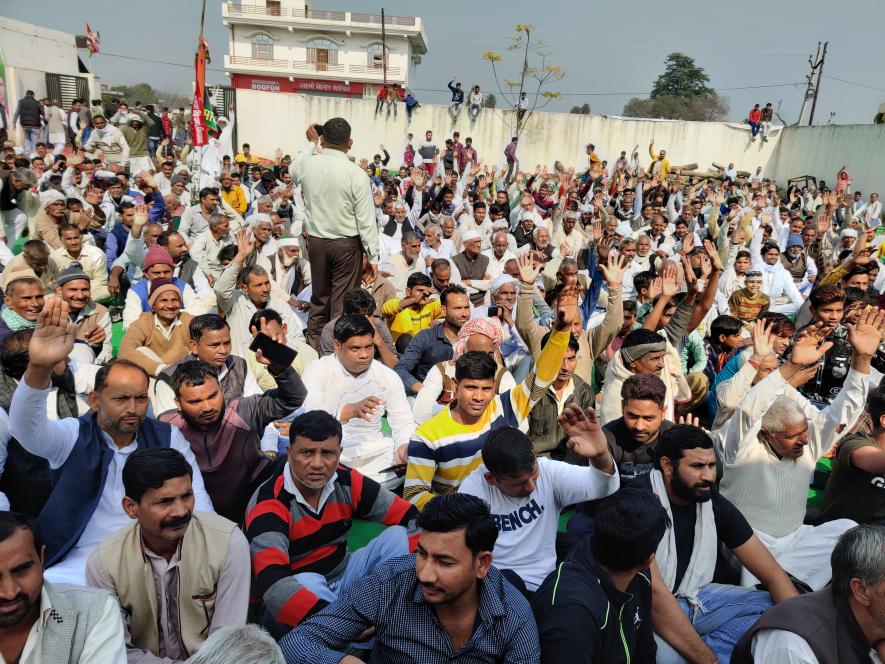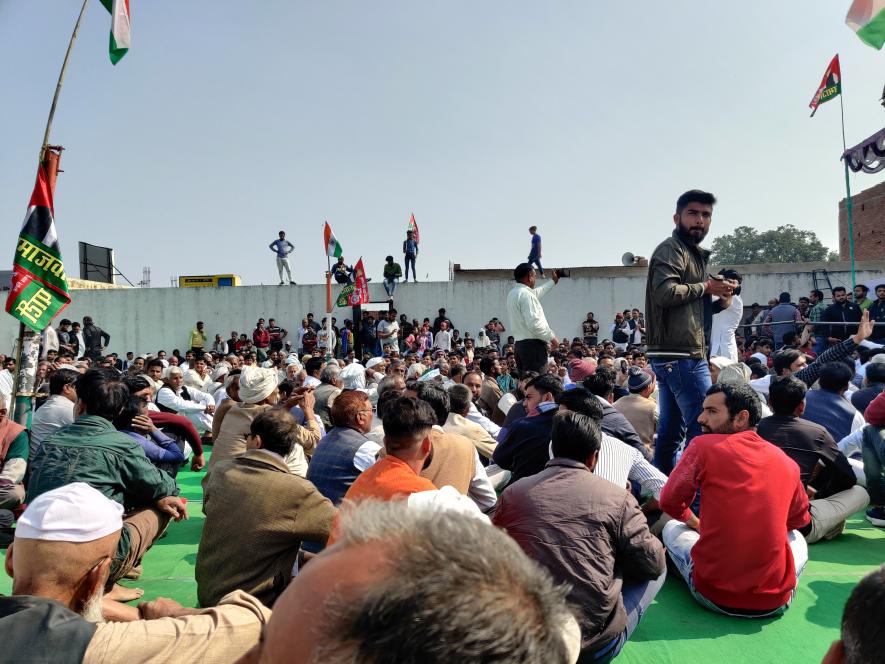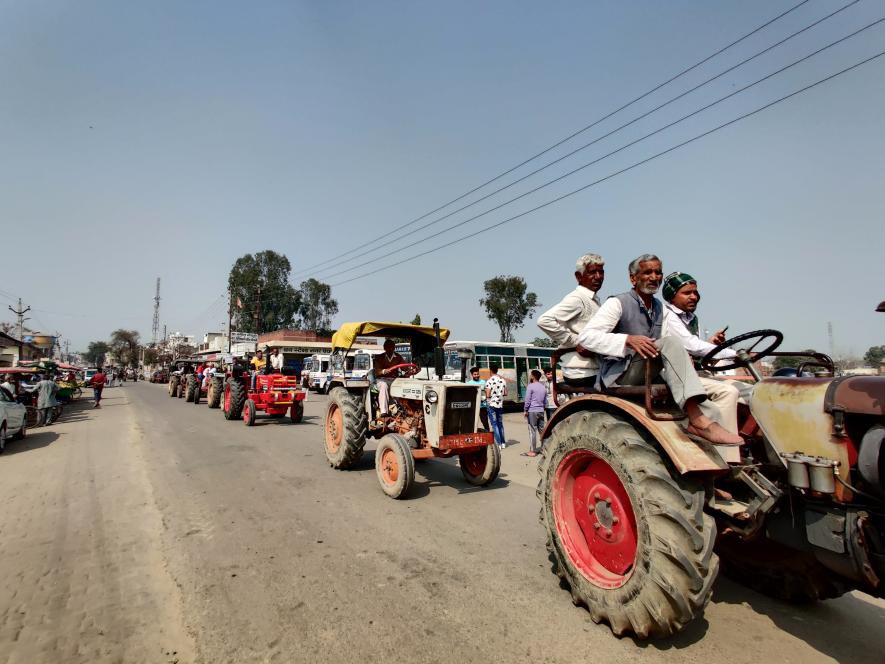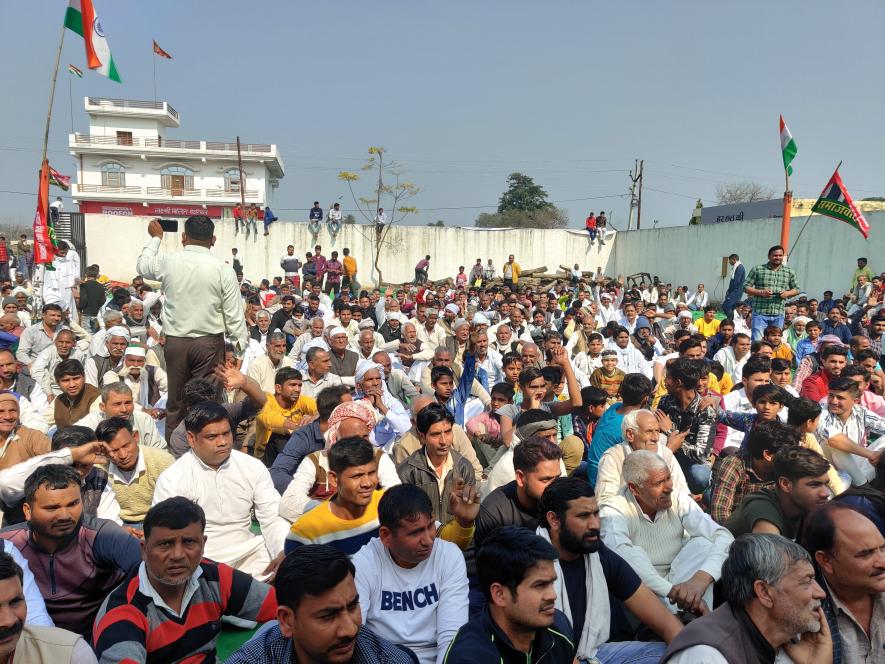Farm Laws: How Much Sway do Mahapanchayats and Khaps Hold in Jatland Politics

Phalauda, Meerut: ‘Hum dekhenge Lazim hai ki hum dekhenge.’ The iconic poem written by Faiz Ahmad Faiz in 1979 was sung from the stage in the town of Phalauda town in Meerut district where a kisan mahapanchayat was organised on February 11. The poem was followed by slogans hailing Hindu-Muslim unity and ‘kisan ekta zindabad’ (long live farmers’ unity).
Patriotic songs praising the role of Bhagat Singh in the freedom struggle and Manoj Kumar’s famous ‘Mere Desh Ki Dharti’ were also heard to keep the farmers upbeat. Amid hookahs and people playing the dhol there were also food packets and arrangements for water.
The mahapanchayat was attended by around 1,500 people, all of whom gathered on a four-hour notice. Those living as far as 10 kms from the venue also attended the panchayat.

Speeches were made and mimicry artists kept the audience entertained. One of those from the panchayat’s organising team was also seen telling people to help maintain the peace and keep a lookout for any anti-social elements.
The kisan mahapanchayats, essentially large village council meetings, have worked as a primary force in mobilising farmers from across Haryana and Uttar Pradesh. Kisan mahapanchayats came about close to three weeks ago on January 28 when Bharatiya Kisan Union (BKU) leader Rakesh Tikait had an emotional outburst with the administration allegedly ready to end the farmers agitation against the Farm Laws at the Ghazipur Border.
The same night, hundreds of tractors marched to Delhi from different corners of Haryana and western Uttar Pradesh on the call of the khaps who saw the son of Mahendra Singh Tikait crying.

Since that day, hundreds of councils and khaps have been addressed by the Chaudharies (prominent people from their areas) calling for farmers’ unity to keep the movement going till the Centre repeals the three contentious laws.
A Spectator at a Mahapanchayat
Hundreds of men from different walks of life join the council in a bid to listen to their leaders who they call ‘Chaudhary’. The opinions of the Chaudharies lead to conclusions which are then accepted as a kind of order.
The stage featured prominent people from the neighborhood as well as political bigwigs who reminded those assembled of the unfulfilled promises made by the ruling Bharatiya Janata Party (BJP).
Atul Pradhan, a Samajwadi Party functionary, was one of the main speakers at this particular panchayat. He laid out all the problems with the laws and why they were being opposed by farmers from across India.
“Wo Mahendra baba ke bete hai aur wo waha par sarkaari atyachaar ki wajah se ro diya. Hum se ye bardhaasht nahi hoga. Yahaan ka kisan agar sarkaar banva sakta hai to usi sarkaar se kala kanoon wapas karva kar rahega (He is the son of Baba Mahendra Singh Tikait and he cried because of the atrocities by the government. We cannot tolerate this and if the farmer can help a government come to power then farmers will force the government to withdraw these black laws as well),” Pradhan told the mahapanchayat.
Each of those on the stage were requested to come forward and address those assembled as Ghulam Mohammed Jaula, the 82-year-old BKU veteran, fired salvos at the Centre. “Farmers feed the country but the government is calling us Khalistanis, terrorists and what not. Do we not know who was behind the violence on Republic Day during the tractor parade?” he shot forth.
“They wanted us to divide but this time we know all their strategies. They offered to suspend the laws for 18 months but we refused their offer because we want these laws to be annulled completely or else the farmers of this country will die of hunger and everything will go to private players like Adani and Ambani. Dear friends, do not be divided on religious lines because when a farmer produces everyone eats and farming in itself is a religion,” Jaula said from the stage, adding: “Everything from airports to gas is going to the private sector and farmers are dying by suicide; so, we will not allow the government to take our soil, water and crops from us,” he added.
“Those who are trying to explain the benefits of not having a minimum support price (MSP) and of contractual farming should first start working in the fields,” he said, with the mahapanchayat concluding with slogans of Kisan Ekta Zindabad, Hindu-Muslim Ekta Zindabad.
Notably, a mahapanachayat is a gathering of farmers from 10 to 12 villages while a khap is a gathering of people from a particular sub-caste. In western Uttar Pradesh and Haryana there are 18 khaps in existence and each has its own Chaudhary. Above them is a khap sachiv or secretary whose duty is to call for a khap meeing whenever required. The headquarter of all the 18 khaps lies in the village of Soram in Muzaffarnagar district, about 140 kilometers from the national capital of New Delhi.
While the mahapanchayats and khaps have witnessed large-scale participation by male farmers, the absence of women was largely down to them supporting the protest by working in the fields and taking on the extra burden.

It is also to be mentioned that the khaps, which have been questioned for their patriarchal diktats like ‘girls will not wear denims’, have always been at loggerheads with women.
Mahapanchayat and the 2022 Polls
The Jat community constitutes about 17% of the population of Uttar Pradesh and its members are in sizable numbers in 19 districts, particularly in the sugarcane belt. The ruling BJP was able to make inroads in the state by sweeping seats in western Uttar Pradesh.
Sensing the anger among members of the Jat community and other Hindu sub-castes, the BJP top brass, including Sanjeev Balyan, have started interacting with the public in view of the 2022 polls in the state. Sitting at a tea shop in Meerut, Balyan told Newsclick: “The issue of the farmers will be solved through dialogue. This is a government of the farmers and will work for the farmers.” He, however, refused to say when the government would resume a dialogue with the farmers.
The pressure has also mounted on the BJP due to mahapanchayats being held in the adjoining state of Haryana. The state had Jat leaders at the helm for 33 years as against 20 years for non-Jat leaders. The farmers agitation also led to the resignation of three prominent Jannayak Janata Party (JJP) leaders. There may be further damage to the party and its coalition government with the BJP in the state would then be on shaky ground.
Get the latest reports & analysis with people's perspective on Protests, movements & deep analytical videos, discussions of the current affairs in your Telegram app. Subscribe to NewsClick's Telegram channel & get Real-Time updates on stories, as they get published on our website.
























